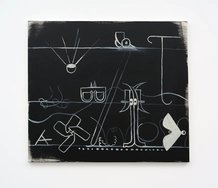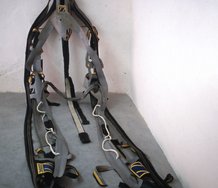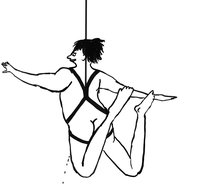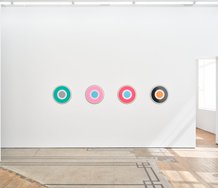John Hurrell – 23 March, 2012
It was exciting to see an artwork that wasn't a video or film, but an action occurring at the time that you witnessed it - while you were sitting in the comfort of your own home.
London
Jérôme Bel
Shirtology at Tate
Curated by Catherine Wood and Kathy Noble
23 March 2012, 9.00 am
This morning at 9 o’clock I was lucky enough to watch the first global-wide piece of online performance art transmitted live from a studio in Tate Modern, London. The work was designed for worldwide transmission, not for a local audience, and so it was remarkable to see art that was not going to be documented or repeated. It lasted for about 18 minutes, and then was followed by a half hour interview with Jérôme Bel the artist, that included a selection of questions sent in from viewers using social media.
Bel is a French choreographer and experimental dancer now established in performance. Today’s work consisted of him standing in front of the camera with the image aimed at his face and torso. A stocky wiry fellow in his late thirties, he wore blue jeans and about thirty faded t-shirts on top of each other. These he proceeded to reveal, examine on his chest for about thirty seconds and then after removing, throw in a heap.
The order of these t-shirts was very carefully thought through, as many had words printed in English and French, and images. These he read out aloud, enunciating words like ‘summer’, ‘heat’, ‘water’ and ‘l’amour’. One t-shirt had musical notation of a popular tune by Mozart which he proceeded to sing (delightfully badly) note by note, and another image of a dancer he mimicked. The sequencing of T-shirts was witty in its use of surprise for some were repeatedly blank, others instructed him to redo what he had just completed or to relax, another got him to dance to the music as he sang; one even told him to shut up and dance.
Bel’s work seems to be a wry parody of consumerism and audience manipulation, perhaps a laugh about the fashion industry and youth culture. In his movements he wasn’t as poised or graceful as you might expect, but he had an appealing clumsiness and awkwardness that endeared. It was exciting to see an artwork that wasn’t a video or film, but an action occurring at the time that you witnessed it - while you were sitting in the comfort of your own home. Far more exciting than live sport from the northern hemisphere, this was smart and humble at the same time. Quite brilliant. The next performance in this series will be on Thursday 26 April.
Here is the link to Shirtology: Watch the documentation here.
John Hurrell
Recent Comments
Owen Pratt
Both usafolk minimum wage franchises Andrew, McD seems post war pop which is fair for Tate mod but the roots ...
Andrew Paul Wood
John, I love the Tate, but I see no need to become a fawning fanboy. The institution should never be ...
Owen Pratt
Brown sugar, black coffee. In a global historical way.

 Advertising in this column
Advertising in this column Two Rooms presents a program of residencies and projects
Two Rooms presents a program of residencies and projects



This Discussion has 14 comments.
Comment
James R Ford, 2:40 p.m. 23 March, 2012 #
Hi John
When you say "first global-wide piece of online performance art transmitted live" you can't mean ever? I curated this group performance over the web from my bedroom in 2006...
http://www.jamesrobertford.com/kitsonkaleidoscope/
John Hurrell, 4:37 p.m. 23 March, 2012 #
Thanks for this James. Looks like an interesting project and I take your point. I guess now though, with the technology BMW can pay for, and the huge audience numbers the Tate's links via social media can generate, the work has become a huge event. Be interesting to know just how many New Zealanders watched it.
Andrew Clifford, 5:30 p.m. 23 March, 2012 #
Sounds like hyperbole to me. Surely there have been many live performances simulcast to viewers in realtime, either by closed circuit, broadcast technology or internet? Nam Jun Paik's Good Morning Mr Orwell would be one.
Andrew Clifford, 5:32 p.m. 23 March, 2012 #
Or is it just that it is the first to take place live from Tate Modern? Which makes them quite slow at this sort of thing. With enough qualifiers, it's not really that hard to have a world first.
John Hurrell, 5:40 p.m. 23 March, 2012 #
What is special is a venue in a major institution devoted solely to live art, with no local audience sitting in. I think there will also be venues for that as well (ie stages with seating) in the wing they are building.
Andrew Paul Wood, 12:18 a.m. 26 March, 2012 #
Th Physics Room did a live streaming virtual picnic with venues around the world back in 2004, I think.
John Hurrell, 9:22 a.m. 26 March, 2012 #
Thing is, Andrew, the Tate would be considered by many to be the top art institution in the world. This live event had a big build up, with pre-event interviews with the director, two curators and artist - plus stuff on the history of performance art. So they were after a huge audience - using a lot of social media. Like a football game, but an art spectacle.
Andrew Paul Wood, 3:58 p.m. 26 March, 2012 #
That kind of privileging is irrelevant in pure artistic terms. The actual evidence speaks for itself, and the genuine art world - not the poseurs and celebutarts - will discern the redundancy of the Tate's bloated and redundant gesture. Bigger is only better in Texas.
John Hurrell, 4:05 p.m. 26 March, 2012 #
So you boycott the vast programme of Tate online artist interviews, concerts, lectures, forums and performances do you, Andrew? An ostrich with integrity, eh?
Owen Pratt, 7:55 p.m. 26 March, 2012 #
The Tate is to art what Starbucks is to Mellville.
Megan Dunn, 8:26 a.m. 27 March, 2012 #
Validation? Homage?
Owen Pratt, 6:08 p.m. 27 March, 2012 #
Brown sugar, black coffee. In a global historical way.
Andrew Paul Wood, 6:12 p.m. 28 March, 2012 #
John, I love the Tate, but I see no need to become a fawning fanboy. The institution should never be more important that the actual art. Owen, probably less Starbucks than McDonalds.
Owen Pratt, 7:42 p.m. 28 March, 2012 #
Both usafolk minimum wage franchises Andrew, McD seems post war pop which is fair for Tate mod but the roots of Tate and Lyall are in the Lousy Anna slave fields, which chimes with the coffee trade esp Tate Liverpool, being housed in one of the worlds greatest slaver cities
Perhaps it is in the DNA of such an institution to try to spread its influence globally.
Participate
Register to Participate.
Sign in
Sign in to an existing account.